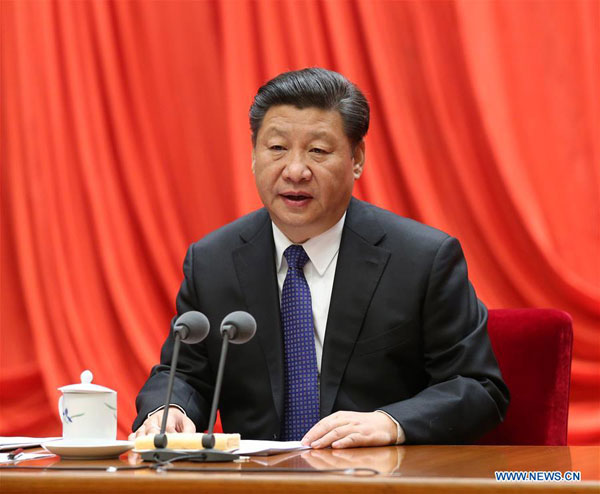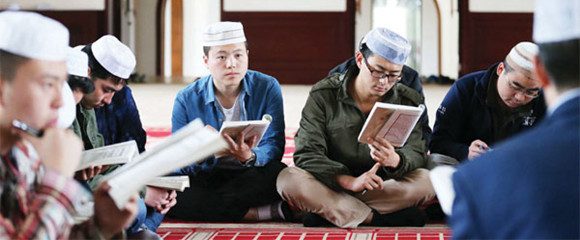Strict governance of Party essential to its mission
Updated: 2016-05-12 08:20
By GUO YADING(China Daily)
|
|||||||||
 |
|
Chinese President Xi Jinping, also general secretary of the Communist Party of China (CPC) Central Committee and chairman of the Central Military Commission, addresses the 6th plenary session of the 18th CPC Central Commission for Discipline Inspection (CCDI) in Beijing, Jan 12, 2016. [Photo/Xinhua] |
Whether the campaign to promote stricter governance of the ruling Party can achieve the expected and desired effects depends on whether effective education and disciplines can be put in place, and whether a sharp sword is hanging overhead to deter violations of the Party's rules.
Since the 18th National Congress of the Communist Party of China convened in late 2012, the CPC Central Committee with Xi Jinping as general secretary has adhered to stricter governance of the Party and introduced a strategic layout for building the Party.
Xi's theories and views on stricter governance of the Party are important guides for the comprehensive advancement of this work, and the push for stricter Party governance demonstrates Xi's sense of responsibility and mission as the leader of the Party.
Without stricter governance of our Party, we will sooner or later become disqualified as the ruling party and unavoidably be deserted by history, Xi has said.
Stricter governance of the Party is an inevitable requirement for the socialist cause with Chinese characteristics and the Party's mission to realize the rejuvenation of the Chinese nation.
That Xi has put Party building in the context of the Chinese dream fully reflects the requirements of the times and his resolve to achieve this historical goal. Thus stricter governance of the Party is an inevitable requirement for the completion of the party's mission.
To strengthen Party building from an ideological perspective remains a basic principle. However, history proves that ideology is far from enough.
To promote stricter governance of the Party, we should tightly combine our efforts to strengthen Party building on both the ideological and systematic fronts, and promote their integration, Xi has stressed.
This remark profoundly states the dialectical relationship between the two, and points out the goals and direction for Party building. Such kind of clarification is of practical, targeted and long-term significance.
As Xi has said, to promote stricter governance of the Party requires institutional guarantees. Since Xi took office, revisions to the Party's regulations and the promulgation of new rules have institutionally standardized Party building work and advanced it in a systemic and comprehensive manner.
Experience has demonstrated time and again that if confined to partial aspects, Party building does not achieve expected effects. Given that the different aspects of Party building are mutually connected and cannot be separated, only with an overall plan, that is comprehensively advanced and evaluated can Party building achieve its purpose.
The CPC is a party that possesses abundant political resources and thus Party building should be based on its own political advantages and show its distinct characteristics. In this sense, the stress Xi has repeatedly put on the need to inherit and carry forward the Party's fine traditions is not only a reflection of the past experiences of Party building, but also a requirement for the current and future building of the Party.
Running through Xi's philosophy of stricter Party governance is a strong "problem" awareness and a clear "problem" orientation, both of which testifying to Xi's pragmatic attitude and sense of responsibility. These are also reflected in his severe crackdown on corruption and relentless campaign to eradicate extravagance and improve the government's working style.
Under the leadership of Xi, the Party will surely give Chinese people a satisfactory answer sheet in its campaign for stricter self-governance.
The author is a professor with the party school of Zhejiang provincial committee.
Related Stories
Xi warns of Party 'cabals and cliques' 2016-05-03 21:10
China's top political advisory body highlights Party leadership 2016-03-14 23:03
Top Chinese legislator pledges loyalty to Party 2016-03-11 00:37
Senior govt officials accused of corruption, expelled from Party 2016-01-19 15:25
Today's Top News
China urges EU to honor MES status, despite parliamentary vote
Generation of new imams preach peace
Streaming stars
China vows to step up anti-corruption co-op
Chinese entrants in public speaking contest fight hard
Global anti-corruption summit opens in London
Britain raises threat of terror attacks to higher level
Chinese students to benefit from EU rules easing
Hot Topics
Lunar probe , China growth forecasts, Emission rules get tougher, China seen through 'colored lens', International board,
Editor's Picks

|

|

|

|

|

|







